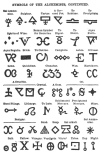
The Philosophy of Natural Magic, by Henry Cornelius Agrippa, L. W. de Laurence ed. [1913], at sacred-texts.com

The Philosophy of Natural Magic, by Henry Cornelius Agrippa, L. W. de Laurence ed. [1913], at sacred-texts.com
This volume would be incomplete without the symbols of the Alchemists, as they naturally pertain to Natural Magic, and occasionally prove of great value. The London Pharmaceutical Journal, an excellent authority, gives the symbols we here introduce.
Nowadays chemists write their formulas and work out their processes by means of symbols, and the alchemists used also signs and hieroglyphics to represent the then known elements, metals, and other substances in common use.
The so-called elements—Fire, Water, Air, Earth—were represented by special symbols, here represented. The metals were supposed to be influenced by the planets to a certain degree, and were represented by the corresponding signs of the Zodiac. Various other articles also had their symbols, which served as a means of shorthand at a period when caligraphy was little known or employed. Gold, for instance, was associated with the Sun because of its brightness and perfection, for it was always held to be the noblest of metals. The symbol applied to it embodies these qualities. Silver resembles the Moon in lustre, and the origin of the crescent needs no explanation. Iron was dedicated to Mars, being the metal from which implements of war were made, Mars being the god of war, probably owing to the blood-red color of the planet. Saturn was the slowest of the planets, and lead, being the dullest and most despised of metals, was therefore accorded to Saturn. Quicksilver was, of course, most appropriate to Mercury, the messenger of the gods.
Dr. Pereira derives all these symbols from gold and the Greek cross, taken to represent acrimony the supposititious substance, which, combined with gold, produced other metals. Copper, for instance, has the
sign of gold on top, and that of acrimony underneath. Quicksilver derived its symbol from that of silver on the top, because of its color, that of acrimony beneath, and gold between, because gold was supposed to lurk in all metals. Iron was supposed to contain acrimony of a different nature from that of the other metals, being represented in this symbol by the barbed spearhead. Fire and Water being antagonistic are represented by the same symbol, one being inverted. Air, which was supposed to be a modification of fire, has a modified fire symbol, whilst the fourth hypothetical element has for its symbol that of air inverted. These are based on Aristotle's doctrine, which taught that the four elements had each two qualities, one of which was common to some other elements.

Click to enlarge
SYMBOLS OF THE ALCHEMISTS AND THEIR SIGNIFICATIONS.

Click to enlarge
SYMBOLS OF THE ALCHEMISTS, CONTINUED